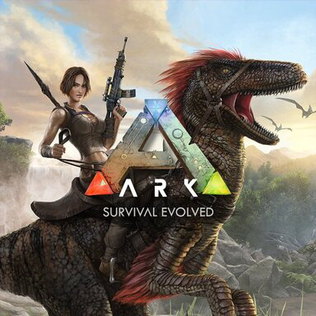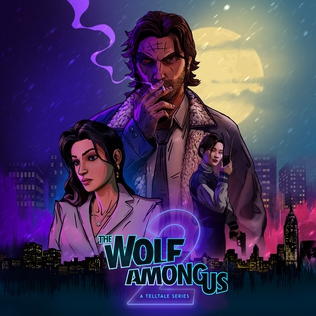
Blizzard Entertainment, Inc. is an American video game developer and publisher based in Irvine, California. A subsidiary of Activision Blizzard, the company was founded in February 1991 as Silicon & Synapse, Inc. by three graduates of the University of California, Los Angeles: Michael Morhaime, Frank Pearce and Allen Adham. The company originally concentrated on the creation of game ports for other studios' games before beginning development of their own software in 1993, with games like Rock n' Roll Racing and The Lost Vikings. In 1993, the company became Chaos Studios, Inc., and then Blizzard Entertainment soon after being acquired by distributor Davidson & Associates early in the following year. Shortly after, Blizzard released Warcraft: Orcs & Humans.

Warcraft Adventures: Lord of the Clans is a cancelled graphic adventure game developed by Blizzard Entertainment and Animation Magic from 1996 until 1998. Set in the Warcraft universe after the events of Warcraft II: Beyond the Dark Portal, it followed the orc character Thrall in his quest to reunite his race, then living on reservations and in slavery following its defeat by the human Alliance. Assuming the role of Thrall, the player would have used a point-and-click interface to explore the world, solve puzzles and interact with characters from the wider Warcraft series.
Obsidian Entertainment, Inc. is an American video game developer based in Irvine, California. It was founded in June 2003, shortly before the closure of Black Isle Studios, by ex-Black Isle employees Feargus Urquhart, Chris Avellone, Chris Parker, Darren Monahan, and Chris Jones.
Toys for Bob, Inc. is an American video game developer based in Novato, California. It was founded in 1989 by Paul Reiche III and Fred Ford and is best known for creating Star Control and the Skylanders franchise, as well as for working on the Crash Bandicoot and Spyro franchises.
Ninja Theory Limited is a first-party British video game developer for Xbox Game Studios based in Cambridge, England. Notable games it has developed include Kung Fu Chaos, Heavenly Sword, Enslaved: Odyssey to the West, DmC: Devil May Cry, and Hellblade: Senua's Sacrifice.

Video gaming in the United States is one of the fastest-growing entertainment industries in the country. The American video game industry is the largest video game industry in the world. According to a 2020 study released by the Entertainment Software Association, the yearly economic output of the American video game industry in 2019 was $90.3 billion, supporting over 429,000 American jobs. With an average yearly salary of about $121,000, the latter figure includes over 143,000 individuals who are directly employed by the video game business. Additionally, activities connected to the video game business generate $12.6 billion in federal, state, and local taxes each year. World Economic Forum estimates that by 2025 the American gaming industry will reach $42.3 billion while worldwide gaming industry will possibly reach US$270 billion. The United States is one of the nations with the largest influence in the video game industry, with video games representing a significant part of its economy.

S.T.A.L.K.E.R. is a first-person-shooter survival horror video game franchise developed by Ukrainian game developer GSC Game World. The series is set in an alternate version of the present-day Chernobyl Exclusion Zone in Ukraine, where, according to the series' backstory, a mysterious second Chernobyl disaster took place in 2006. As a result, the physical, chemical, and biological processes in the area were altered, spawning numerous nature-defying anomalies, artifacts, and mutants. The player takes the role of a "stalker" - a name given to trespassers and adventurers who have come to explore the exclusion zone and its strange phenomena.
The Coalition is a Canadian video game developer based in Vancouver. A subsidiary of Xbox Game Studios, a division of Microsoft, the company was founded in 2010 as Zipline Studios. Following the release of its debut game, Relic Rescue (2011), Zipline was renamed Microsoft Game Studios Vancouver. In February 2012, the studio released the flight simulator Microsoft Flight. Later that year, in November, Microsoft Game Studios Vancouver was rebranded as Black Tusk Studios. After Microsoft acquired the rights to the franchise Gears of War in 2014, the studio was commissioned to develop new games in the series. Black Tusk was renamed The Coalition in June 2015, and in August released Gears of War: Ultimate Edition, a remaster of the original Gears of War (2006). In the ensuing years, the studio developed Gears of War 4 (2016) and Gears 5 (2019). It also collaborated with Mediatonic and Splash Damage to develop the real-time strategy Gears Pop! (2019) and the turn-based tactics Gears Tactics (2020), respectively.
Dovetail Games (DTG), a trading name of RailSimulator.com Ltd (RSC), is a British simulation video game developer and publisher established in 2008 by former Electronic Arts executive Paul Jackson, Fund4Games backers Tim Gatland and Charlie McMicking, and a development team from Kuju Entertainment.

Ark: Survival Evolved is a 2015 action-adventure survival video game developed by Studio Wildcard. In the game, players must survive being stranded on one of several maps filled with roaming dinosaurs, fictional fantasy monsters, and other prehistoric animals, natural hazards, and potentially hostile human players.

Allison Road is an unreleased first-person survival horror video game. It was in development at Lilith Ltd, and was to have been published by Team17 for Linux, Microsoft Windows and OS X. It would have been a spiritual successor to P.T., the playable teaser for the cancelled game Silent Hills. Before funding by Team17 was secured, Allison Road had been in development by fans.

Installation 01 is an upcoming fan-made first-person shooter video game based on the Halo series, developed by Soon Studios for Microsoft Windows, macOS, and Linux operating systems in Unreal Engine 5.

The Wolf Among Us 2 is an upcoming episodic graphic adventure game being developed and published by Telltale Games with the assistance of AdHoc Studio, a studio that consists of former Telltale staff. It is a sequel to the 2013 game The Wolf Among Us, with the title taking place six months following the events of the previous title.

Little Devil Inside is an upcoming action-adventure video game developed and published by Neostream Interactive. The game's single-player and co-operative multiplayer modes both follow the professional and personal lives of explorers searching for monsters & supernatural events in a 19th-century-inspired world. It is planned for initial release on Microsoft Windows, PlayStation 4 and PlayStation 5, and will be followed by Nintendo Switch and Xbox One shortly after.

Spellbreak was a free-to-play, class-based third-person shooter video game developed by Proletariat for Microsoft Windows, PlayStation 4, Xbox One and Nintendo Switch, released on September 3, 2020.

S.T.A.L.K.E.R. 2: Heart of Chornobyl is an upcoming first-person shooter survival horror video game developed and published by Ukrainian game developer GSC Game World. It will be the fourth game released in the S.T.A.L.K.E.R. video game series as well as the first S.T.A.L.K.E.R. game in 15 years since the release of Call of Pripyat in 2009.

Microsoft Gaming is an American multinational video game and digital entertainment division of Microsoft based in Redmond, Washington established in 2022. It produces the Xbox video game consoles and services, in addition to overseeing production and sales, and is led by CEO Phil Spencer, who oversaw Xbox since 2014. Its five development and publishing labels consist of: Xbox Game Studios, Bethesda Softworks, Activision, Blizzard Entertainment, and King.

Palworld is an upcoming action-adventure, survival, and monster-taming game created and published by Japanese developer Pocketpair. The game is set in an open world populated with animal-like creatures called "Pals", which players can battle and capture to use for base building, traversal, and combat. Players may also assign the “Pals” to bases where they will automatically complete tasks for the player. Palworld can be played either solo or online with up to 32 players on one server. It was announced in 2021 and launched through early access for Windows, Xbox One, and Xbox Series X/S in January 2024. The game will also be released on macOS later in 2024.
Beginning in 2023 and continuing into 2024, the video game industry has experienced mass layoffs. Over 10,000 jobs were lost in 2023, and an additional 10,700 jobs were lost in 2024 from January to June. These layoffs had reverberating effects on both established game development studios and emerging companies, impacting employees, projects, and the overall landscape of the gaming industry. The layoffs caused several video games to be canceled, video game studios to be shut down or divested from their parent company, and thousands of employees to lose their jobs.













